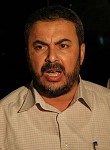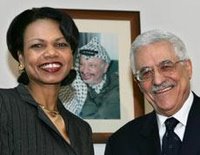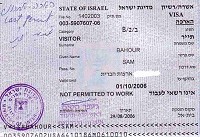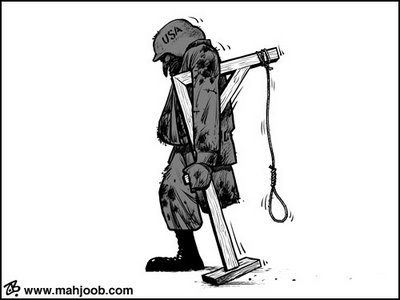Loss of a native land
 An old Toronto man tells of his life in Palestine and his impossible dream of returning to Jerusalem. It's too late for Sami Hadawi.
An old Toronto man tells of his life in Palestine and his impossible dream of returning to Jerusalem. It's too late for Sami Hadawi.HICHAM SAFIEDDINE - Toronto Star August 31, 2003
Let death first lay me low, and Death free me from this daylight There is no sorrow above The loss of a native land
— Euripides, 485-406 B.C.
In a recurring but blurry vision, the walls of a Jerusalem Christian cemetery beckon Sami Hadawi to lie under their shade and fall into a deep slumber. But Hadawi will never return home to Jerusalem. Like his wife before him, he leads his life in painful reminiscence and will carry the grief with him to a grave dug in a foreign land.
The 99-year-old Toronto resident's dilemma is inextricably linked to the thorniest of all issues at the heart of the Middle East conflict: Palestinians' right of return.
Israel denies it. Palestinians insist on it. The failure to reach a compromise has meant a continuing loss of opportunity for a resolution of the conflict.
The beginning of Hadawi's story, like those of other Palestinians, is buried under decades of displacement and yearnings for restitution.
He was born in West Jerusalem in what was then Ottoman-ruled Palestine. Growing up in his grandfather's house in the Jewish quarter of the city, he worked for the British government during its mandate of Palestine and at age 44 moved to a house he built for his own family in the Christian quarter.
Little did Hadawi know that the days following his move would usher in a period of homelessness for his family and coincide with the beginning of an era of regional wars and political unrest in the Middle East.
It was 1948, the year of the partition of Palestine and the creation of the State of Israel.
Sitting in his room at the Gibson Retirement Residence in Toronto's northeast end, Hadawi recalls the harsh circumstances of his departure.
"I spent all my life building a house and I lived in it for six or seven days. The house was taken away from us. We were thrown out ... I never wanted to leave ... I left everything ... I was left with nothing."
Hadawi says the pain of parting with his homeland, and the memory of losing his wife shortly after, remains undiminished after all these years.
"I try not to think about the past, because the past hurts a great deal. You don't want to hate people; you don't want to curse people ....
"I had nothing against the Jews all my life ... but what was done (in Palestine) was unforgettable."
Hadawi's account of his family's exodus from the land of his ancestors is representative of stories of many Palestinians now living in the diaspora. What was seen by immigrating Jews at the time as the realization of a dream of nationhood was viewed by displaced Arabs as a catastrophe of deliberate depopulation.
The native population of Arabs regarded the new-found colonies of Zionists in the late 19th and early 20th centuries as a precursor to full Jewish nationhood at their expense.
These fears were deepened by the famous Balfour declaration in 1917, a pledge by the then British foreign secretary to support the establishment of a Jewish national home in Palestine.
The definitive turning point for both peoples came in May, 1948, when the British Mandate ended, Israel was officially proclaimed a sovereign entity and Palestinians, supported by neighbouring Arab states, took up arms in resistance.
To Hadawi and more than 700,000 other Palestinians, this marked the inauguration of their lives as refugees — stateless people who lost their normal place of residence, property and means of livelihood.
Fifty-five years later, their population has grown to approximately 4 million, including a second wave of refugees displaced from the West Bank and Gaza after the 1967 Six Day War.
Based on statistics compiled by the United Nations Relief Works Agency for Palestine refugees, 1.3 million of them live in 59 recognized camps in Jordan, Lebanon, Syria, the West Bank and Gaza.
Most of the land on which these makeshift communities were constructed is leased to the U.N. agency by the host governments. The refugees do not own it. Living conditions of these camps are generally poor, with a high population density and an underdeveloped infrastructure.
Issam Al-Yamani, who moved to Canada in 1982 and now lives in Mississauga, was born a refugee in Lebanon and has experienced these conditions.
I remember how every day as a child I had to leave my grandfather's house in the Burj Al-Barajnah refugee camp to use the common washrooms.
"Washrooms were built in a yard with no running water and no doors. Each person brought his water with him. Each block of 10 houses — four walls topped with a zinc sheet — had one washroom. Children would go to do what they have to do in the morning and wait until their parents come and take their places.
"At night, most people used to defecate in holes they dug near their home and cover them with sand. It was a very humiliating experience.
"Inside the so-called houses — in most cases one room — husband, wife and children used to sleep on the floor. I can't imagine how married people used to make love, but I am sure it was not romantic."
Al-Yamani's family comes from Suhmata, a village near the city of Acre in northern Israel.
At night, after dinner, children sat around their parents and grandparents. They listened to stories about the village in Palestine, how beautiful it is, how tasty the olives, the figs and the grapes are. Palestine became the hope, the dream home for these children.
--------------------------------------------------
`I would like to be buried in Jerusalem, but I have no choice. Once I am dead, it is all finished'
Sami Hadawi, 99-year-old Toronto resident
---------------------------------------------------
The Canadian Kafieh family is a case in point.
Ottawa's James Kafieh knew something was always missing about him and he wanted to learn where he came from.
He set out to educate himself and enrolled in a course on Middle Eastern history during his years as an undergraduate at the University of Waterloo.
At age 23, he was highly influenced by a book, Bitter Harvest: A Modern History Of Palestine, written by a former official land valuer during the British Mandate who also worked with the U.N. Palestine Conciliation Commission and later became director of the Institute of Palestine Studies in Beirut.
The author's name was Sami Hadawi.
Soon afterward, Kafieh began a series of trips to the Middle East during which he visited his family's village of Ein Karem on the outskirts of West Jerusalem in what is now Israel. He looked for the house of his father but couldn't find it.
"I looked for it in 1984 and again in 1990, 1996 and 1997," he says.
"Finally, on a trip in 2001, I saw it. My father had found a photograph of the house. The pattern of the bricks and the mould growing on parts of it were like a fingerprint.
"When I compared the photo to the house, I found it was a DNA match. After all these years, I stood in front of the house — built by my grandfather — my connection to time immemorial.
"Kafieh says he traced ownership of the house to his family using archival records kept at an Israeli government registry office in Jerusalem.
His exhilaration at his discovery did not last long. The house was now listed as an asset of the Israel Land Administration, an agency that has control over most Palestinian refugee lands confiscated after its owners fled or were expelled in fighting during the spring of 1948.
Kafieh finds it unjust that while Israeli law clearly states that "every Jew has the right to come to this country" — even if he or she was not born there or owned any land — people like him and his father seeking to reclaim what was theirs are denied title.
"We constantly hear about the Jewish community seeking the return of dormant assets, unpaid insurance and other forms of reparation for their losses in WWII.
"And they are right to do so. But why are Palestinian homes any less important?"
He also points out that thousands of Jewish families migrate to Israel every year and argues that if the Israeli government only had the will, it could accommodate Palestinians wishing to return.
The counter-argument that such reparation will threaten the Jewish character of Israel is dismissed by Kafieh as a violation of Israel's claims to democracy.
Kafieh's opposition to the current state of affairs in Israel largely stems from his strong belief that any country, including Israel, must be based on secular foundations that treat all its citizens as equal before the law.
"I don't think it was right to build a Jewish state, and I don't think it is right to build an Islamic state or a Christian one," he contends.
He argues that in the long run, the only just and morally acceptable peace settlement must involve a secular one-state solution in which people of all religions co-exist under one set of non-discriminatory laws.
"Any other compromise, such as the currently proposed model of two states for two peoples, is bound to trigger more bloodshed and political strife," he says.
Although the prospects of a one-state solution are hard to imagine in the face of a rising tide of extremism among Palestinians and Israelis alike, Kafieh is convinced that it is only a matter of time before it becomes inevitable.
For now, he is working hard to find the means of retrieving his father's property in the latter's lifetime. His father, Khalil, 77, today resides in Richmond Hill.
Will the fruits of James Kafieh's toil stand, in contrast to Hadawi's?
Twelve years after Kafieh read Hadawi's book, the men's paths crossed in person when Kafieh accompanied the Palestinian scholar on a trip to Jerusalem.
He urged Hadawi to drop by his old house. Hadawi refused for fear that the sight of it standing metres before him and yet so far out of his reach would be too much to handle.
The obstacles facing Kafieh's struggle to win back his family's property may also prove to be too much.
"Would you like some ice cream, Mr. Hadawi?" a young waitress at the Gibson dining hall asks the weary old man. He shakes his head and stares at the cold salmon sandwich on his otherwise empty plate.
The passage of time has robbed him of the ability to recount his daily activities.
Whatever is left of his memory is reserved for the outlines of a tale of dispossession and his Sisyphus-like struggle.
When asked where he wants to be buried, Hadawi says:
"I don't care. I am sure I will be buried here. I would like to be buried in Jerusalem, but I have no choice. Once I am dead, it is all finished."
Like many aging Palestinian refugees, his memories soon will disappear like the shade of trees at midday.
Nothing will remain.








































